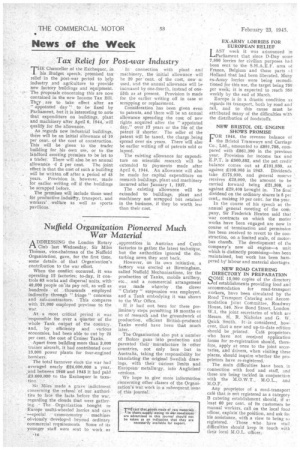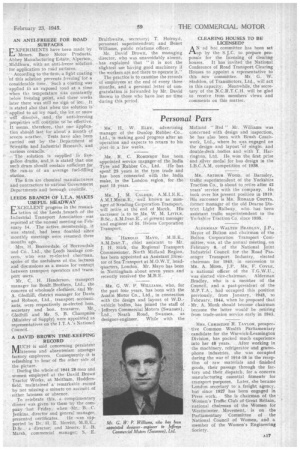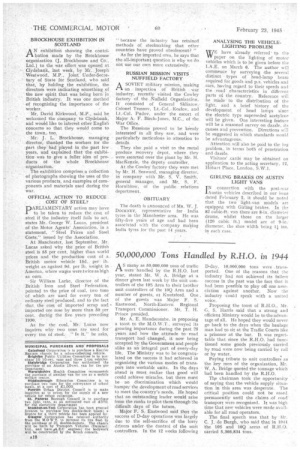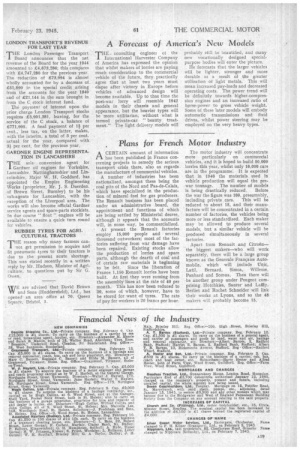News of the Week
Page 18

Page 19

Page 20

Page 21

If you've noticed an error in this article please click here to report it so we can fix it.
Tax Relief for Post-war Industry THE Chancellor of the Exchequer, in his Budget speech, promised tax relief in the post-war period to help industry and agriculture to provide new factory buildings and equipment. The proposals concerning this are now contained in the new Income Tax Bill. Thor , are to take effect after an "appointed day" to he fixed by Parliament, but it is interesting to note that expenditure on buildings, plant and machinery after April 6, 1944, will qualify for the allowance.
As regards new industrial buildings, there will be an initial allowance of 10 per cent. of the cost of construction. This will be given to the trader building for his own use, or to the landlord erecting premises to be let to a trader. There will also be an annual
allowance of 2 per cent. The joint effect is that the cost of such abuilding will be written off after a period of 45 years. Provision is, however, made for earlier writing off if the buildings be scrapped before.
The premises will include those used for productive induitty, transport, and workers' welfare as well as sports pavilions. In connection with plant and machinery, the initial allowance will be 20 per ' cent, of the cost, new o: used, and the annual allowance will be increased by one-fourth, instead of onefifth as at present. Provision is made for the earlier writing off in case ol scrapping or replacement.
Consideration has been given even to patents, and there will be an annual allowance spreading the cost of new rights acquired elle] the " appointed day," over 17 years or the life of. the patent if shorter. The seller of the patent will be taxed, the charge being spread over six years. There will also be earlier writing off of patents sold or lapsed.
The existing allowance for expenditure on scientific research will be extended to payments made after April 6, 1944. An allowance will also be made for capital expenditure on research buildings, plant and machinery incurred after January 1, 1937.
The existing allowance will be extended to buildings, plant and machinery not scrapped but retained in the business, if they be worth less than their cost. EX-ARMY LORRIES FOR EUROPEAN RELIEF
Lj AST week it was announced in la...Parliament that since D-Day some 7,500 lorries for civilian purposes bad been sent to the S.H.A.E.F. area of France, Belgium and those parts 1,f Holland that had been liberated. Many ex-Army lorries were being reconditioned for this use, the target being 750 per week; it is expected to reach 350 weekly by the end of March.
Europe is in a drastic condition as regards its transport, both by road and rail, and to this cause must be attributed many of the difficulties with the distribution of foodstuffs.
NEW BRISTOL OILENGINE SHOWS PROMISE FOR 1944, the revenue balance ot the Bristol Tramways and Carriage Co., Ltd., amounted to £891,788, compared with £861,390 in the previous year. Provision for income tax and E.P.T. is £560,582, and the net credit' balance comes out at £191,930, as against £198,905 in 1943. Dividends take £175,030, and general reserve receives £25,000. the amount to be carried forward being £21,308, as against £29,408 brought in. The final' dividend on the ordinary shares is 5 pet cent„ making 10 per cent, for the year.
In the course of his speech at the annual general meeting of the company, Sir Frederick Heaton said that war contacts on which the motor works have been engaged are now in course of termination and permission has been received to revert to the construction, on a limited scale, of motorbus chases_ The development of the company's new oil engine—a unit which is distinctly promising—has been maintained, but work has been hampered by' labour and material shortages NEW ROAD CATERING DIRECTORY IN PREPARATION
S01111E 15,000 copies of the directory of establishments providing food and accommodation for road-transport workers, have been circulated by the Road Transport Catering and Accommodation Joint Committee, Roadway House, 146, New Bond Street, London, W.1, the joint secretaries of which are Messrs. H. R. Nicholas and G. W. Quick Smith. It is considered, however, that a new and up-to-date edition should be ,printed. Café proprietors who have not received application forms for re-registration should, therefore, apply at once to the joint secretaries, and 'drivers, when visiting these places, should inquire whether the proprietors have re-registered.
The main difficulties have been in connection with food and staff, and these are being tackled in conjunction with the M.O.W.T., M.O.L., and M.O.F.
Any proprietor of a road-transport café that is not registered as a category B catering establishment should, if at least 60 per cent, of its customers be manual workers, call on the local food officer, explain the position, and ask for his assistance, with a view to being so registered. Those who have ,talt difficulties should keep in touch with their local M.O.L. officer,
AN ANTI-FREEZE FOR ROAD SURFACES
EXPE12IMENTS have been made. by
• Messrs. Baco Mot& Products, Abbey Manufacturing Estate, • Alperton, Middlesex, with an anti-freeze solution: for application to road•suefaces.
According to the firm; a light coating of this solution prevents freezingfor a considerable time. Such a coating was applied to an 'exposed road at a time. When ths temperature was constantly' below freezing . point, and three weeks. later there was still no sign of ice. . It is stated also that when the solution. is applied to an icy road, the ice or snow will dissolve, ;and., the anti-freezing properties will continne to be effective. It seem, therefore, that one application should last for about a month cl severe weather. Tests have also been carried out • by the ' Department • of Seientific and Industrial Research, and various conncils. • : The , solution is supplied in' fiye--. gallon druths, and, it is Stated that one such drum should contain sufficient fox the run-iit of an average fuel-filling station.
The firm are chemical manufacturers and contractors td,variouS Government. Departments and borough council.
LEEDS BRANCH OF 1:T.A. MAKES USEFUL' HEADWAY'
EXCELLENT progress in the re.suscitation Of 'the Leeds branch of the .Industrial Transport Association' was reported at the annual meeting on Feb ruary 14. The active nierribership, it was stated, had been doubled since monthly meetings were resumed three
months ago. • Mrs. H. Borrowdale, of Borrowdale and Co., Ltd., the Leeds haulage concern, • who was re-elected chairman, spoke of the usefulness of the lectures and discussions as a means 'for contact between transport operators and transport users. • Mr, C. H.. Henderson, transport manager for. Boult,Brothets, Ltd., the concern of wholesale clothiers, and Mr. A. Gledhill, district manager for Davis and Robson, Ltd., transport accountants, were respectively re-elected hon., secretary and hon. treasurer. Mt. Gledhill and Mr. S. B. Charripniss (Ministry of Supply),were appointed as representatives on the I.T.A.'s National Council.
• A DAVID •BROWN TIME-KEEPING RECORD -
MUCk.f. is .said concerning persistent. lateness and absenteeism amongst factory employees, Consequentlyit is refreshing to hear of the other side of the picture. • During the whole•of 1944 28 men and Women employed at the David Brown Tractor Works, at Meitham, Huddersfield, maintained aremarkable record by not missing a minute on account. cif . either lateness or absence.
To celebMte this, a complimentary 'dinner wa's given to' them • by the cont pany 'last Friday;, when -Mt.: B.., C. Jenkins, director' a•nd general. manager., presented certificates. He was 'sapported by Dr. 1-1, 13: Merritt,
D.Sc:, a director; and Messrs. • F. -B. Marsh, commercial manager; S. E. Braithwaite, secretary; T. Holroyd, personnel superintendent; and Benet Williams, public relations officer: Mr. David Brown, • the managing director, who was unavoidably absent; has explained that " it is not . the slightest use having good machinery if the workers are not there to operate it.'' The practice is to examine the records of employees at the end of every three months, and a personal letter of congratulation is forwarded by Mr. David Brown to those who have lost no time during this period. CLEARING HOUSES TO BE' LICENSED?
AN -ad hoc committee has been set up by the S.J.C. to prepare proposals for the licensing of clearing houses. It has invited the National Conference of Road Transport Clearing Houses to appoint a representative to. this new committee. Mr. G. W. Staddon, of Transnaotors, Ltd., will act in this capacity. Meanwhile, the' secretary of the N.C.R.T.C.11. will be glad to receive from members views and comments on this matter.
BROCKHOUSE EXHIBITION IN SCOTLAND
AN exhibition showing the contribution made by the Brockhouse organization (J. Brockhouse and Co., Ltd.) to the war effort was opened at Clydebank, last week, by Mr. Joseph Westwood, M.P., Joint Under-Secretary of State for Scotland, who said that, by holding the exhibition, the directors were indicating something of the new spirit that was being born in British industry. It was one method of recognizing the importance of the Worker.
Mr. David Kirkwood, M.P., said he welcomed the ciampany to Clydebank, and would like to interest other English concerns so that they would come to the town,. too.
Mr. J. L. Brockhouse, managing director, thanked the workers for the part they had played in the past few years, and explained that the exhibition was to give a fuller idea of products of the whole Brockhouse organization.
The exhibition comprises _a collection of photographs showing the uses of the various products, and examples of components and materials used during the war.
OFFICIAL ACTION TO REDUCE. , COST OF STEEL?
PARLIAMENTARY action may have to be taken to reduce the cost of steel if the industry itself fails to act, states Mr. George W. Lucas, president of the Motor. Agents' Association, in a statement. " Steel Prices and Steel Costs," issued by the Association.
At Manchester, last September, Mr. Lucas asked why the price of British steel is 55 per cent, higher than world prices and the production cost of a British motor vehicle 15d. per ih. weight as against 9d. per lb. weight in America, where wages were twice as high as ours.
Sir William Larke, director of the British Iron and Steel Federation, pointed to the price of coal, two tons of which are used for every ton of ordinary steel produced, and to the fact that the cost of imported scrap and imported ore rose by more than 50 per cent, during the five years preceding 1930. As for the coal, ▪ Mr. Lucas now inquires why two tons are used for every ton of steel. " Is it," he asks, " because the industry has retained methods of steelmaking that other countries have proved obsolescent? "
As for the imported ores, he says that the all-important question is why we do not use our own more extensively.
RUSSIAN .MISSION VISITS NUFFIELD FACTORY
A SOVIET military mission, making an inspection of British war industry, recently visited the Cowley factory of the Nuffield Organization. It consisted of General Skliarov, Colonel Trussov, Lt.-Col. Koziol,. and Lt.-Col, Pudov, under the escort of Major A,F. Birch-Jones, M.C., of the War Office.
The Russians proved to be keenly interested in all they saw, and were particularly meticulous in attention to details.
They also paid a visit to the metal produce recovery depot, where they were escorted over the plant by Mr. H. Mackenzie, the deputy controller.
At the Cowley factory they were met by Mr. H. Seaward, managing director. in company with Mr. S. V. Smith, general manager, and Mr. S. F. Horniblow, of the public relations department.
OBITUARY The death is announced of My. NV, J. DOCKNEY, representative for India tyres in the Manchester area. He was fifty-five years of age and had been associated with the company making India tyres or the past 14 years.
ANALYSING THE VEHICLELIGHTING PROBLEM WE have already referred' to the paper on the lighting of motor vehicles which is to be given before the I.A.E. on March 6. The author will commence by surveying 'the .several distinct • types of • head-lamp beam required for goods and p.s. vehicles and cars, having regard to their speeds and the road characteristics in different parts of the country. Reference will be made to the distribution of the light, and a brief history of the development of head lamps since the electric type superseded acetylene will be given. One interesting feature will be a reasoned survey on dazzle, its causes and prevention. Directions will be suggested in which standards would be acrVantageous.
Attention will also be paid to the fog problem, in terms both of penetration and dazzle.
Visitors' ,cards may be obtained on application to the acting secretary, 12. Hobart Place, London, S.W.1.
GIRLING BRAKES ON AUSTIN LIGHT VANS
IN connection with the post-war Austin vehicles described in our issue dated February 2, it should be noted that the two light-van models are equipped with Girling brakes. In the 82 cubic-ft. van there are 8-in, diameter drums, whilst those on the larger (120 cubic ft.) model are of 9-in. diameter, the shoe width being l ins. in each case,
LONDON TRANSPORT'S REVENUE • FOR LAST YEAR TLondon Passenger Transport
' Board announces that the net revenue of the Board for the year 1944 amounted to £4,673,286; this compares with £4,747,280 for the previous year. The reduction of £73,994 is almost wholly accounted for by a decrease of £51,890 in the special credit arising from the accounts for the year 1940 and of £21,144 in the sum brought in from the C. stock interest fund.
The payment of interest upon the prior charge London Transport stocks requires £3,901,381, leaving, for the service of the C stock, a balance of £771,905. A final payment of 11 per cent., less tax, on the latter, makes, with the interim, a total of 3 per cent. actual for the year, compared with 31 per cent, for the previous year,
GARDNER ENGINE REPRESENTATION IN LANCASHIRE
THE sole conversion agent for Gardner oil engines for Yorkshire, Lancashire, Nottinghamshire and Lincolnshire, Major W. H. Goddard, has appointed the _ Empire Engineering Works (proprietor, Mr. J. S. Duerden, of Brown Street, Burnley) to be his sub-agents for Lancashire, with the exception of the Liverpool area. The works will also become official Gardner service agents and spare-parts stockists. In due course " float " engines will be available to ensure a quick turn round for vehicles.
RUBBER TYRES FOR AGRICULTURAL TRACTORS THE reason why many farmers cannot get permission to acquire and fit pneumatic tyres to their tractors is due to the present acute shortage. This was stated recently in a written reply by Mr, Hudson, Minister of Agriculture, to questions put by Sir G. Owen.
WE are advised that David Brown and Sons (Huddersfield), Ltd., has opened an area office at 70, Queen Square, Bristol, I.




















































